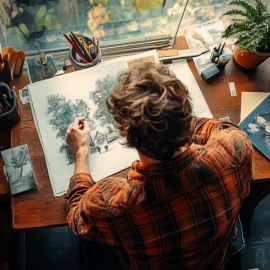

This article is an excerpt from the Shortform book guide to "The Like Switch" by Jack Schafer and Marvin Karlins. Shortform has the world's best summaries and analyses of books you should be reading.
Like this article? Sign up for a free trial here.
Are you wondering how to make good friends? What makes someone a good friend?
In The Like Switch, Jack Schafer and Marvin Karlins address four factors they claim are necessary for any budding friendship to succeed. They also advise on how to draw people to you and how to connect with new friends.
Keep reading for a breakdown of Schafer and Karlins’s advice on how to make good friends.
The 4 Essential Factors of a Strong Friendship
Schafer and Karlins argue that every friendship depends on four basic factors. Without them, your friendships will struggle to thrive, especially when they’re just starting out. Let’s look at these four factors so you know how to make good friends.
The first factor is seeing the other person in the same physical space over time, whether at work, school, or in a personal context. When you occupy the same space as someone else, you have the opportunity to develop a personal connection with them. Shared occupation of physical space also creates familiarity, making a person seem less threatening.
(Shortform note: Studies show that Schafer and Karlins’s emphasis on maintaining proximity in friendships is well-founded. Data suggests that the closer you live to someone, the more likely you’ll be friends with them—80 percent of an average person’s friends live within 600 miles of their home. Despite the widespread use of social media giving us the chance to connect with people anywhere in the world, regular in-person interaction with those near to us still provides the bedrock of friendships because we depend on verbal and nonverbal language to build the trust necessary for strong relationships.)
The second factor is how often you’re around each other. It’s not enough to be in the same space—you have to be in the same space frequently so that your potential friend gets used to your presence.
The third factor is the length of time you spend together. Whether positively or negatively, people have a greater effect on each other’s behavior the longer they associate with one another.
The fourth and final factor is the depth of your relationship. You can judge this based on how well you fulfill each other’s emotional and intellectual needs.
(Shortform note: Though Schafer and Karlins discuss the need for frequent, substantial time spent together to develop closeness in friendships, they don’t specify the amount of time needed to make this happen. You might think it depends on the individual, but studies have found that different stages of friendship can be predicted fairly universally based on hours spent together. According to their results, it takes between 40 and 60 hours spent together to develop an acquaintanceship, 80 to 100 hours to grow that into a friendship, and over 200 hours to become close friends. Therefore, to achieve the fourth factor of meeting each other’s emotional and intellectual needs, you’ll likely need to spend substantial time together.)
Qualities That Attract New Friends
When you’re looking for potential friends, you may find it difficult to capture people’s attention. The authors describe a list of qualities that will better your chances of attracting new connections.
Inspiring curiosity. Have you ever noticed someone doing something in public that made you want to stop and ask them about it, like drawing a picture or filming a video? Curiosity naturally draws us to people. If you show off your unique hobbies, interests, and quirks, you’ll likely connect with people simply because they can’t resist finding out why you’re doing what you’re doing.
(Shortform note: Schafer and Karlins suggest you showcase a unique hobby or skill to make friends in the real world. You can do the same to attract dates using your profile picture in dating apps. According to experts, choosing a profile picture that inspires a sense of mystery and curiosity in potential matches will bring you success by enticing people to find out more about you. Maybe you’re a weekend woodworker, a film enthusiast, or an expert kayaker. Whatever hobby you choose to display, this picture will be your first impression on potential dates, so pick one that will inspire curious conversation openers.)
Being attractive. Schafer and Karlin argue that being attractive (according to society’s beauty standards) makes it easier to make friends. Attractiveness involves more than your basic physical features—the way you dress, the way you hold yourself, and how you act can also impact it. We attribute more positive qualities, like intelligence and honesty, to attractive people, so more people will want to be around you if you’re judged as such.
(Shortform note: As the authors assert, we often attribute positive traits, like good health, kindness, and intelligence, to conventionally good-looking people. However, being attractive also comes with some disadvantageous assumptions that can stall the development of interpersonal relationships. Being physically attractive may make people seem intimidating and unapproachable. Attractive people are also often unfairly judged as entitled, self-centered, and incompetent, traits that most of us would want to avoid in friends.)
Making people laugh. The funnier you are, the more likely you’ll attract friends. If you’re able to keep interactions lighthearted and relaxed with appropriate use of humor, people will find it easier to open up to you. Your relationships will then progress more quickly. Laughter also releases endorphins, which help people associate good feelings with your presence.
Having high self-esteem. When you’re confident in yourself, you’re more likely to find it easy to talk to others and share personal information. Sharing helps to build intimacy and rapport in relationships, so the more you’re able to do this, the more people will want to be your friend.
Common Points of Connection
According to the authors, one of the easiest ways to start a new relationship is by finding common ground. When looking for friends, we’re not likely to seek out people who are substantially different from us—for example, people with opposing political views—because they introduce perspectives that conflict with our own. This leads to anxiousness, as it forces us to question what we believe to be true. To avoid these feelings, most of us seek out people who reinforce the beliefs and understandings we already hold. Common ground may take the form of common interests, common values, or common experiences.
Finding common interests with someone, like a shared interest in video games or reading, boosts your self-esteem. When someone likes the same things you do, you feel validated. The same goes for shared values. For example, you may forge a connection with someone based on your shared moral belief in veganism. This kind of connection reinforces your current worldview and thus your sense of comfort.
(Shortform note: Are you a superfan of anything? If so, then finding gatherings with other members of the fandom can be a great step toward finding people with the same interests and values as you. People from across the world gather at fan events, at conventions, and online to celebrate and commiserate over their favorite TV shows, sports teams, bands, books, games, and comics. Fandoms provide opportunities for people with common interests who might never otherwise meet to find acceptance and community with each other. Many fan communities also have huge collective power due to their shared values. For example, in 2020, fans of the K-Pop group BTS raised one million dollars in 24 hours for the Black Lives Matter movement through their social media-based efforts.)
Finally, you may find common ground through a shared experience, past or present. You and the other person will have a set of shared memories, associations, and understandings because the same environment or events shaped you. For example, maybe you grew up in the same town or you work at the same company. Sometimes, we even bond over shared painful experiences because we feel close to people who went through the same thing we did.
(Shortform note: Psychological research supports Schafer and Karlins’s assertion that painful experiences can provide common ground for friendships. Experiments involving undergraduate students revealed that performing painful tasks in a group setting increases cooperation and solidarity among group members. Groups that were given a task involving minor pain, like dunking their hand in cold water, reported a greater sense of loyalty toward their groupmates than groups that were given a neutral, non-painful task. This may explain why physically demanding experiences like boot camps and team sports help people to forge strong bonds.)

———End of Preview———
Like what you just read? Read the rest of the world's best book summary and analysis of Jack Schafer and Marvin Karlins's "The Like Switch" at Shortform.
Here's what you'll find in our full The Like Switch summary:
- How to cultivate the qualities you need to attract and connect with new friends
- How to have meaningful, smooth conversations with friends
- How you can productively manage conflict in relationships






